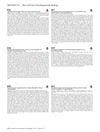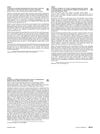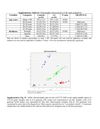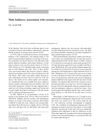 September 2023 in “Journal of the American Academy of Dermatology”
September 2023 in “Journal of the American Academy of Dermatology” Having PCOS does not make hidradenitis suppurativa worse.
 April 2017 in “Journal of Investigative Dermatology”
April 2017 in “Journal of Investigative Dermatology” The study found a link between the severity of Lichen Planopilaris seen by doctors and the details seen under a microscope, and created a new way to measure this severity.
3 citations,
October 2022 in “Journal of Cosmetic Dermatology” CAR is a useful marker for assessing alopecia areata severity.
35 citations,
December 2014 in “Clinical and experimental dermatology” Oxidative stress may play a role in causing alopecia areata.
14 citations,
July 2021 in “Anais brasileiros de dermatologia/Anais Brasileiros de Dermatologia” Interleukin levels are higher in alopecia areata patients but don't predict disease severity or duration.
 8 citations,
May 2022 in “Journal of medicine and life”
8 citations,
May 2022 in “Journal of medicine and life” COVID-19 patients may experience hair loss, but it's not linked to their age or sex.
 November 2023 in “Biology”
November 2023 in “Biology” Lower hair copper and copper-to-zinc ratio are linked to more severe coronary artery disease.
 November 2023 in “International Journal of Trichology”
November 2023 in “International Journal of Trichology” Trichoscopic features help diagnose and assess female pattern hair loss severity, with inflammation playing a key role.
 April 2022 in “International journal of respiratory and pulmonary medicine”
April 2022 in “International journal of respiratory and pulmonary medicine” People with lower levels of free testosterone tend to have worse COVID-19 outcomes.
 August 2019 in “Journal of The American Academy of Dermatology”
August 2019 in “Journal of The American Academy of Dermatology” PFD patch helps laser tattoo removal, trichoscopy diagnoses AGA, and serum boosts SOD activity.
 20 citations,
June 2010 in “Genes and Immunity”
20 citations,
June 2010 in “Genes and Immunity” Blood tests can help understand the genetic differences in people with alopecia areata, including how severe it is and if it's inherited.
 October 2021 in “QJM: An International Journal of Medicine”
October 2021 in “QJM: An International Journal of Medicine” People with severe hair loss have higher levels of a protein called interleukin 17 in their blood.
 October 2024 in “Archives of Dermatological Research”
October 2024 in “Archives of Dermatological Research” Higher GPER-1 levels are linked to more severe and shorter-duration androgenetic alopecia, suggesting GPER-1 as a potential treatment target.
 34 citations,
June 2014 in “The BMJ”
34 citations,
June 2014 in “The BMJ” Pregnancy can change skin disease severity, with some conditions improving and others worsening, and treatment should balance benefits and fetal safety.
 4 citations,
January 2016 in “Annals of Dermatology”
4 citations,
January 2016 in “Annals of Dermatology” More severe hair loss links to thicker heart fat, suggesting possible heart disease risk.
 2 citations,
January 2006 in “Technical report”
2 citations,
January 2006 in “Technical report” The document concludes that better tools are needed to measure skin disease severity in dermatomyositis and cutaneous lupus erythematosus, and introduces the DSSI and CLASI as reliable instruments.
 January 2016 in “Ankara Üniversitesi Tıp Fakültesi mecmuası”
January 2016 in “Ankara Üniversitesi Tıp Fakültesi mecmuası” Severe hair loss (androgenetic alopecia) is linked to higher risk of heart disease (cardiovascular atherosclerosis).
 3 citations,
February 2019 in “Disease Markers”
3 citations,
February 2019 in “Disease Markers” The index to ring finger ratio may indicate disease severity in female ankylosing spondylitis patients, but not in males.
 January 2014 in “Springer eBooks”
January 2014 in “Springer eBooks” Inflammasome proteins can indicate the severity and treatment response of various diseases and injuries.
 47 citations,
December 2019 in “Frontiers in immunology”
47 citations,
December 2019 in “Frontiers in immunology” A new mutation in the STING protein causes a range of symptoms and its severity may be affected by other genetic variations; treatment with a specific inhibitor showed improvement in one patient.
 7 citations,
July 2020 in “Immunological Investigations”
7 citations,
July 2020 in “Immunological Investigations” The rs231775 genetic variant is linked to a higher risk and severity of Alopecia Areata in males.
December 2021 in “Egyptian Journal of Dermatology and Venereology” Oxidative stress may worsen female pattern hair loss and could help track the disease and treatment.
 151 citations,
May 2021 in “Frontiers in Medicine”
151 citations,
May 2021 in “Frontiers in Medicine” Many patients experience long-lasting symptoms like fatigue and pain after COVID-19, regardless of initial disease severity.
 April 2024 in “Frontiers in medicine”
April 2024 in “Frontiers in medicine” Alopecia Areata significantly lowers quality of life and current treatments are inadequate, highlighting a need for better therapies and standardized treatment protocols.
 3 citations,
April 2015 in “Netherlands Heart Journal”
3 citations,
April 2015 in “Netherlands Heart Journal” Male baldness is not significantly associated with coronary artery disease.
 January 2024 in “JEADV clinical practice”
January 2024 in “JEADV clinical practice” The study helps doctors use patient images to understand and apply SALT scores for treating severe alopecia areata.
 27 citations,
October 2020 in “Experimental Dermatology”
27 citations,
October 2020 in “Experimental Dermatology” Having a lot of gray hair and hair loss are linked to more severe COVID-19.

research Skin
2 citations,
January 2011 in “Elsevier eBooks” Skin problems are common in Lupus patients and can indicate the disease's severity, requiring specific treatments and lifestyle changes.
 13 citations,
January 2018 in “BioMed Research International”
13 citations,
January 2018 in “BioMed Research International” Scalp involvement is common in pemphigus and can lead to hair loss, with the severity of scalp lesions linked to overall disease severity.
47 citations,
August 2016 in “American Journal Of Pathology” Fibroblast changes in systemic sclerosis may help understand disease severity and treatment.

























